GOALKEEPER
Francesco Toldo (Italy) An understudy for much of his international career, Francesco Toldo seized his moment at UEFA EURO 2000. Initially on the squad as backup, Toldo was thrust into the spotlight when Gianluigi Buffon suffered a hand injury just before the tournament. He rose to the occasion spectacularly, becoming one of the stars of the 2000 Uefa European Championship. His standout performance came in the semi-final against the Netherlands, where he was instrumental in Italy’s penalty shoot-out victory, saving an incredible three penalties. Prior to his EURO 2000 heroics, Toldo had impressed with Fiorentina during the 1999/2000 season, earning him a move to Inter Milan in 2001. At Inter, he enjoyed a trophy-laden career, securing five Scudetto titles and capping it off with the prestigious 2010 UEFA Champions League title in his final season with the Nerazzurri.
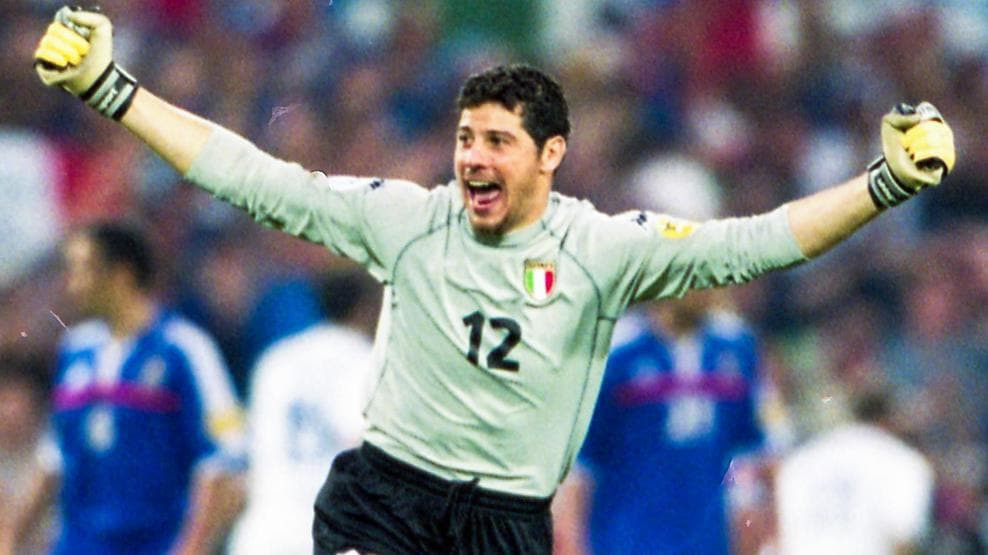 Francesco Toldo, Italy's goalkeeper at UEFA EURO 2000, conceded only four goals in six matches.
Francesco Toldo, Italy's goalkeeper at UEFA EURO 2000, conceded only four goals in six matches.
DEFENDERS
Laurent Blanc (France) A stalwart of French football, Laurent Blanc’s inclusion in the 2000 UEFA EURO Team of the Tournament marked his third such honor, having also been recognized in 1992 and 1996. UEFA EURO 2000 served as a fitting swansong for Blanc’s international career, culminating in a final victory, a triumph he was unfortunately denied at the 1998 FIFA World Cup due to suspension. Nicknamed ‘Le Président’ for his commanding presence, elegant style, and leadership qualities, Blanc was a composed centre-back who began his career as a midfielder at Montpellier. His club career included stints at Barcelona, Inter Milan, and Manchester United, further solidifying his reputation as a world-class defender. Blanc transitioned seamlessly into coaching, winning the league title with Bordeaux and later managing the French national team at UEFA EURO 2012. He further demonstrated his coaching prowess by leading Paris Saint-Germain to two domestic trebles.
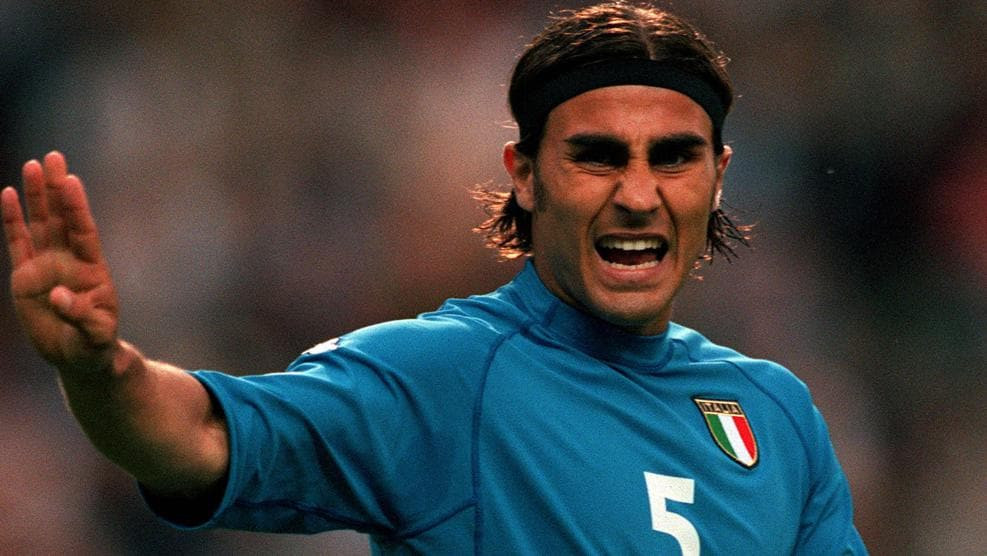 Fabio Cannavaro, a key defender for Italy at UEFA EURO 2000, showcased his tactical brilliance.
Fabio Cannavaro, a key defender for Italy at UEFA EURO 2000, showcased his tactical brilliance.
Fabio Cannavaro (Italy) Fabio Cannavaro’s performances at UEFA EURO 2000 were a precursor to his later global acclaim. He played every match for Italy, exhibiting the defensive masterclass that would later define his career. His tactical awareness and composure were evident throughout the tournament. Six years later, Cannavaro captained Italy to victory at the 2006 World Cup, a year in which he was also awarded both the Ballon d’Or and FIFA World Player of the Year. Prior to EURO 2000, Cannavaro had already tasted European success, winning the 1999 UEFA Cup with Parma. After spells with Juventus and Real Madrid, where he won two La Liga titles, the Naples-born defender concluded his illustrious playing career at Al-Ahli. Cannavaro earned a then-record 136 caps for Italy, highlighting his enduring contribution to the national team. Since retiring from playing, he has ventured into coaching, managing teams in Saudi Arabia and China.
Paolo Maldini (Italy) Universally recognized as one of football’s all-time defensive greats, Paolo Maldini’s presence in the 2000 UEFA EURO Team of the Tournament was a testament to his consistent excellence. Maldini amassed over 1000 appearances for club and country, representing Italy a record 126 times between 1988 and 2002. Despite his unparalleled career, international silverware eluded him, with runner-up finishes at the 1994 World Cup and UEFA EURO 2000 being the closest he came. Ironically, Italy lifted the World Cup in 2006, after Maldini’s retirement from international football. However, his individual accolades at the EUROs were significant, earning Team of the Tournament selections in 1988, 1996, and 2000. His club career with AC Milan was legendary, featuring five European Cups and seven Serie A titles across 25 years. Maldini’s consistent high-level performances throughout 2000 UEFA EURO solidified his place among the tournament’s best.
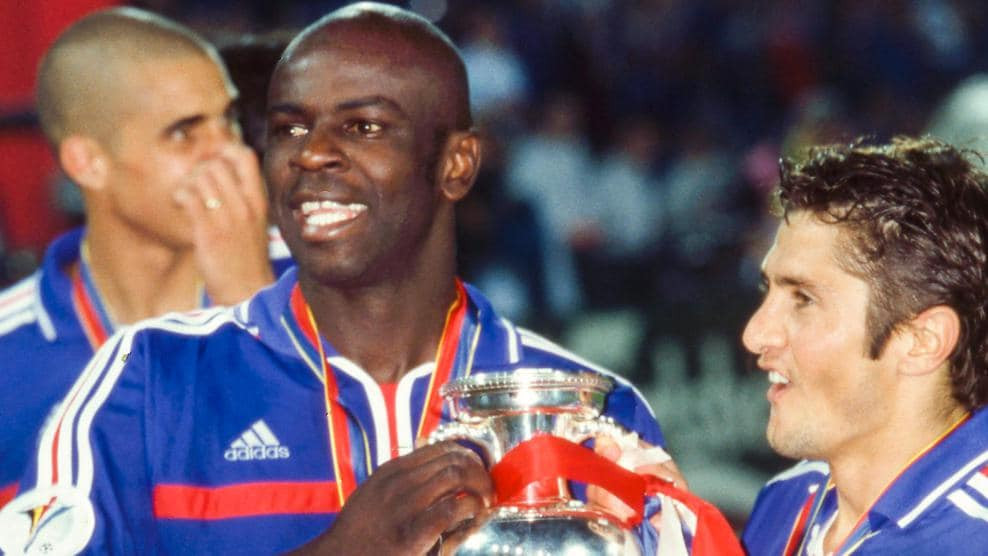 Lilian Thuram, France's EURO 2000 winning defender, brought his World Cup winning form to the tournament.
Lilian Thuram, France's EURO 2000 winning defender, brought his World Cup winning form to the tournament.
Lilian Thuram (France) Lilian Thuram, born in Guadeloupe, was a cornerstone of the French national team for over a decade. His selection for the 2000 UEFA EURO Team of the Tournament was richly deserved following France’s triumph. He accumulated a national record 142 caps during a distinguished 14-year international career, participating in seven major finals and achieving victory at the 1998 World Cup and UEFA EURO 2000. At EURO 2000, Thuram’s composure in defense and powerful forward runs from right-back were crucial to France’s success. He briefly retired from international football but returned to reach the World Cup final again in 2006, showcasing his enduring quality. Thuram’s club career included successful spells with Monaco, Parma, and Juventus, winning trophies at each club, before concluding his career at Barcelona in 2008. His contributions to France’s 2000 UEFA European Championship victory were undeniable.
MIDFIELDERS
Patrick Vieira (France) Patrick Vieira’s emergence as a key figure in the French national team became fully realized at UEFA EURO 2000. While part of the 1998 World Cup-winning squad, he became a central player in the 2000 UEFA European Championship, featuring in all six games. Vieira’s impact was felt both defensively and offensively; his box-to-box dynamism was vital for France. Notably, it was his run that set up Youri Djorkaeff’s decisive quarter-final goal against Spain. During his nine years at Arsenal, the Dakar-born midfielder became a club legend, winning three Premier League titles and three FA Cups, memorably scoring the winning penalty in the 2005 FA Cup final. He later added four Serie A titles to his resume in four seasons with Inter Milan. Vieira transitioned into coaching, starting at New York City FC and currently managing Nice. His performances at 2000 UEFA EURO cemented his status as a world-class midfielder.
Zinédine Zidane (France) Zinédine Zidane’s legacy was further enhanced by his mesmerizing performances at UEFA EURO 2000. While his two goals in the 1998 World Cup final were iconic, many argue that Zidane’s displays at the 2000 UEFA European Championship were even more masterful. ‘Zizou’ briefly retired from international football only to return in 2005, and despite a controversial sending off in the 2006 World Cup final, he still won the Golden Ball award for the tournament’s best player. Zidane’s club career was equally stellar, winning league titles in Italy with Juventus and Spain with Real Madrid. His spectacular winning goal in the 2002 UEFA Champions League final for Real Madrid against Bayer Leverkusen is etched in football history. Following his playing career, Zidane achieved remarkable success as a coach for Real Madrid, leading them to an unprecedented three consecutive UEFA Champions League titles. His artistry on the pitch at 2000 UEFA EURO was unforgettable.
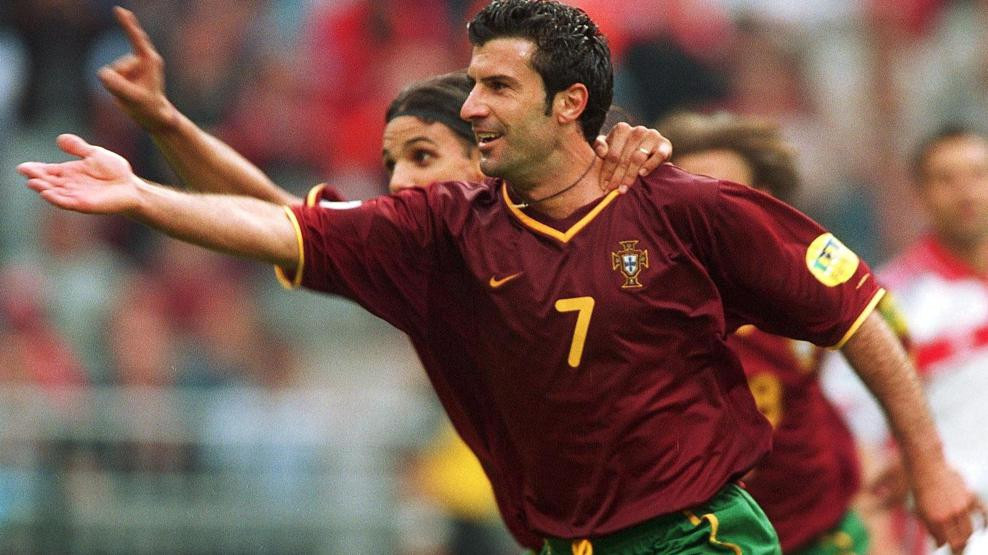 Luís Figo, Portugal's standout midfielder at UEFA EURO 2000, was instrumental to their semi-final run.
Luís Figo, Portugal's standout midfielder at UEFA EURO 2000, was instrumental to their semi-final run.
Luís Figo (Portugal) Luís Figo’s dazzling skills and leadership were pivotal for Portugal at UEFA EURO 2000, earning him a place in the Team of the Tournament. Figo represented Portugal 127 times between 1991 and 2006, scoring 32 goals and becoming a national icon. UEFA EURO 2000 was arguably his peak international tournament; his brilliance propelled Portugal to the semi-finals and earned him the prestigious Ballon d’Or six months later. He also led Portugal to the final of UEFA EURO 2004 on home soil. Figo is one of the few players to have starred for both Barcelona and Real Madrid, winning two league titles and a European trophy with each club. He further added four Scudetto titles with Inter Milan before retiring in 2009. His impact on 2000 UEFA EURO was undeniable, showcasing his world-class dribbling and playmaking abilities.
Edgar Davids (Netherlands) Edgar Davids’ dynamic and combative midfield presence was crucial for the Netherlands at both the 1998 World Cup and UEFA EURO 2000. He drove the Oranje to the semi-finals in both tournaments, although penalty shoot-out defeats denied him a place in the finals. Known for his energy, determination, and distinctive eyewear, Davids was a key member of Ajax’s 1995 UEFA Champions League winning team. After a season with AC Milan, he spent seven successful years at Juventus, winning three Serie A titles, adding to the three he had already won with Ajax. Davids also reached another EURO semi-final at UEFA EURO 2004 before retiring from international football a year later. His tenacious midfield performances were a highlight of 2000 UEFA EURO.
FORWARDS
Patrick Kluivert (Netherlands) Patrick Kluivert shone brightly for the Netherlands at UEFA EURO 2000, hosted in his home nation. While he participated in three EUROs, the 2000 tournament was where he truly made his mark, scoring five goals, including a memorable hat-trick against Yugoslavia. Kluivert burst onto the scene as an 18-year-old, scoring the winning goal for Ajax in the 1995 UEFA Champions League final. His goals against Argentina and Brazil at the 1998 World Cup further elevated his profile, leading to a move to Barcelona. He later played in England and France. Kluivert won league titles with Ajax, Barcelona, and PSV Eindhoven, and scored an impressive 40 goals for the Dutch national team. His goalscoring prowess was on full display at 2000 UEFA EURO.
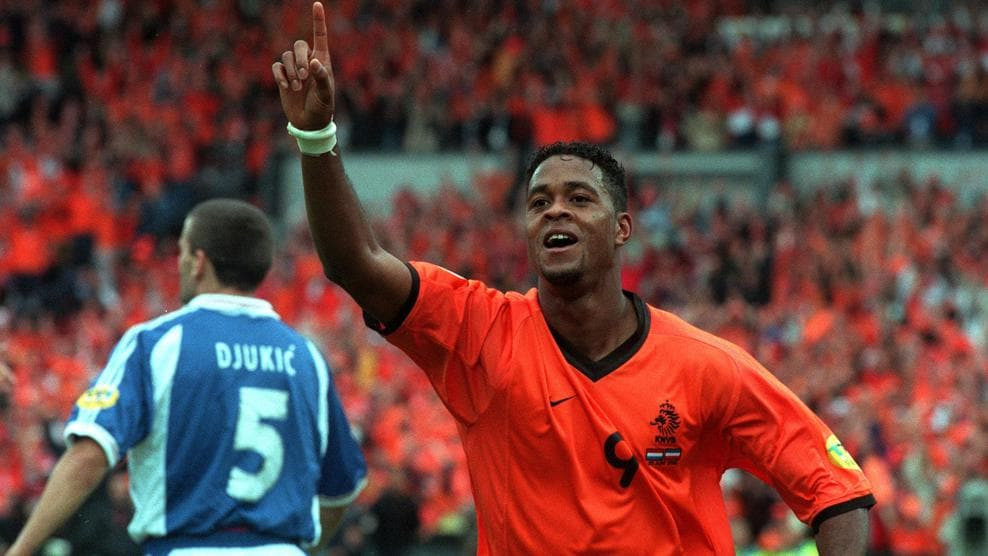 Patrick Kluivert celebrating one of his hat-trick goals against Yugoslavia at UEFA EURO 2000.
Patrick Kluivert celebrating one of his hat-trick goals against Yugoslavia at UEFA EURO 2000.
Francesco Totti (Italy) Francesco Totti’s UEFA EURO 2000 campaign was a revelation, introducing him to a wider international audience. Widely regarded as Roma’s greatest ever player, Totti captained his hometown club to the 2001 Scudetto and holds Roma’s records for both appearances and goals. At EURO 2000, Totti scored twice and injected creativity and flair into the Azzurri attack. He was named man of the match in the final against France, causing significant problems for the formidable French defense. Totti also played a crucial role in Italy’s 2006 World Cup victory. He concluded his international career with 58 caps and nine goals. His dynamic performances at 2000 UEFA EURO were a sign of his future greatness.
